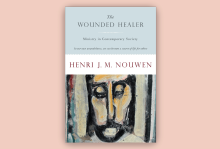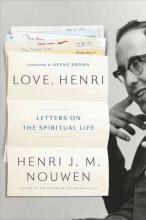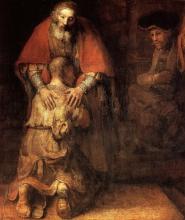henri nouwen

THIS SPRING, MY family and I were discussing what artistic representations of Jesus’ life have shaped our spiritual lives. For one son-in-law, it was Mel Gibson’s The Passion of the Christ, though he noted it is quite violent. For my husband and our adult kids, it was Jesus Christ Superstar. For me, it was seeing “Godspell” in Toronto in 1972 when I was 12. I vividly remember the wide-open energy that kept inviting new disciples into the group of Jesus’ followers, the circus-like performers bursting with enthusiasm, encouraging each other to creatively express what they were discovering together. It was physical, passionate, musical, hilarious. I looked up the musical’s history and discovered that my spirituality was shaped by legends of improv comedy, including Gilda Radner and Martin Short, who went on to be cast members of Saturday Night Live, and Eugene Levy, whose storied career continued this century in Schitt’s Creek.
Perhaps that early spiritual orientation toward freewheeling motion, fun, community inclusion, live performance, and humor is why I appreciate theologian and author Henri Nouwen’s efforts to image our spiritual lives as daring, interdependent trapeze acts.

IN THE WOUNDED HEALER: Ministry in Contemporary Society, Catholic theologian and priest Henri J.M. Nouwen analyzes how the church fails to address the heart of our collective pain and longing. Nouwen presents a paradigm for renewed Christian leadership and care founded on the archetype of the “wounded healer.” More than 50 years after the publication of The Wounded Healer in 1972, we continue to struggle — both individually and societally — with the “wounds” Nouwen names: alienation, separation, isolation, and loneliness. Whether we’re ministers or not, we need the gentle wisdom of the wounded healer to build a more loving, just world.
While the concept goes back at least as far as Plato, the term “wounded healer” was coined by psychoanalyst and doctor Carl Jung. To demonstrate the link between personal suffering and the capacity to care for others, Jung draws on the Greek myth of Chiron. Chiron is a centaur who, due to severe physical pain, becomes an important healer and teacher. Nouwen extends this principle to ministry, calling for church leaders to cultivate “a deeper understanding of the ways in which [they] can make [their] own wounds available as a source of healing.” For both Jung and Nouwen, this work develops depth and compassion. Nouwen writes, “For a compassionate [person] nothing human is alien: no joy and no sorrow, no way of living and no way of dying.”

Though some colors have been removed or added over the years for different reasons, six of the original colors continue to exemplify the shared humanity of everyone who marches under their banner. Each color has a meaning that carries deep significance for the LGBTQ+ community. At the same time, there is a biblical connection to the rainbow that speaks to the promises of God. This Pride month, I feel it’s worthwhile to reflect on what each color has to teach us about God and ourselves.

“A SUGGESTION: Speak much about Jesus.” Henri Nouwen’s recommendation to a friend, captured in Love, Henri—a new collection of his personal correspondence—encapsulates the priest and author’s private and public ministry. More than almost any other modern figure, Nouwen bridged Catholic/Protestant doctrinal divides with his writing to bring spiritual healing and comfort, even as he wrestled with what he termed his inner “demons.”
Edited by Gabrielle Earnshaw and released in conjunction with the 20th anniversary of Nouwen’s death, Love, Henri highlights the priest’s struggle for inner peace and his extensive web of deep friendships. While the collection does not present any shocking revelations, and contains fewer transcendent moments of raw emotion than other collections of Nouwen’s writing, it works well as a meditation on what it means to love selflessly and extend oneself over a lifetime.
In the collection, Henri is both protagonist and antagonist, healing and wounding those in his life. While Nouwen himself acknowledges “a kind of enthusiasm” in his own writing that “seems a little bit too easy,” the gift is watching him participate in these seeker/giver relationships. In early letters, he is often overly attached: “Maybe your distance simply means that I force myself upon you and there is not a mutuality that makes friendship possible.” Later, though, we see him “speak about [his] inner struggles as a source of self-understanding” and solidarity, rather than a way “to avoid difficult positions and responsibility and evoke some sympathy.”

In the two decades since his death from a heart attack at age 64, Nouwen’s popularity and influence have spawned at least five biographies. His reflections on faith, loneliness, vulnerability, love, prayer, social justice, and sexuality have won over modern audiences.
But this beloved priest had an even more intimate side, known only to those who corresponded with him privately.

There is a story in our family lore that during a contentious presidential campaign a few decades ago my father refused to drive his mother, my grandmother, to the polling station on election day. She was voting for the opposing candidate and he didn’t want her to cancel out his vote. Though contentious at the time, it is a story that still evokes laughter in our family each time it is retold. And don’t worry — grandma eventually got a friend to drive her to the polls.

IN NOVEMBER I had the honor of delivering the first annual Henri Nouwen lecture at the University of Toronto. I was invited by the Henri Nouwen Society to speak about the connection between spirituality and social justice and to offer reflections about a remarkable man and the Sojourners community’s relationship with him.
Henri Nouwen was a deeply spiritual and deeply human man whose life and work has inspired many of us in the extended Sojourners community for the last four decades. Our relationship with Nouwen goes back to the 1970s, when he often came to visit our budding community in Washington, D.C. As young firebrands with a passion for social justice, we learned much from Nouwen, who helped teach us the importance of a deep, authentic, contemplative spirituality, which we knew we needed to undergird the hard battles for social justice. Nouwen often shared with us that Sojourners, in turn, helped push him to not lose sight of the urgent struggles for justice and peace in the midst of his efforts to help people unlock a deeper spirituality.
What drew Nouwen to Sojourners, and us to him, was our common conviction that contemplative spirituality, which was his passion and vocation, had to be deeply connected to putting faith into action for justice in the world, which was ours. We spoke together about the dangers of people pursuing spirituality in a consumer culture, where resources aimed at the inner life could become just another commodity.

Sojourners founder and president Jim Wallis appeared Nov. 7 on the Drew Marshall Show, a spiritual talk show that broadcasts on radio stations all over Canada. In the interview, Rev. Wallis discussed a range of topics from baseball and his love of coaching his sons, to Sojourners’ push for immigration reform, Pope Francis’ recent visit, and his upcoming book America’s Original Sin: Racism, White Privilege, and the Bridge to a New America.
Rev. Wallis also talked about his faith journey, from his experience at a revival as a child, to his leaving his home church to join the student movements in the 1960s and 1970s. He discussed the encounter with an elder in his church where an elder said that they had “nothing to do with racism. That’s political. Our faith is private.”
This exchange, Wallis noted, is what led him to eventually leave his church, only to come back to his faith after reading in Matthew 25 about how followers of Christ should treat the “least of these,” and what leads him to say that “Faith is always personal, but never private.”
Henri Nouwen’s unpublished works are set to be released by Convergent Books, according to Religion News Service columnist Jonathan Merritt.
The Dutch Catholic priest who wrote masterpieces like The Wounded Healer, The Return of the Prodigal Son, and Life of the Beloved, left behind enough material for multiple volumes to come over the next few years.

The Christian journey of Lent is upon us. Lent commemorates Jesus’ journey into the wilderness. After his baptism, where Jesus heard the voice of God say to him, “This is my Son, the Beloved, with whom I am well pleased,” Jesus was led by the Spirit into the wilderness. After 40 days of fasting, he was tempted by the devil.
In good mimetic fashion, Jesus had received his true identity from God at his baptism. As radically relational creatures, mimetic theory claims that we receive our identity in relationship with others. If you were to ask me to identify myself, I would respond by referring to my relationships — I am a husband, a father, a son, a friend. Even when we identify ourselves by what we “do for a living,” relationships are implied. An accountant, for example, helps people allocate their financial resources. Our very identity as humans, and everything we do, is dependent upon our relationships with others.
I hope that mimetic theory’s emphasis on human relationality seems obvious, but it actually runs against the modern grain. René Descartes gave the impetus for the modern world with his statement “I think, therefore I am.” But that statement is false. You don’t exist because you think for yourself. You exist because you are related to others.
Jesus received his identity as the Son of God from his relationship with his heavenly Father, but in the wilderness he was tempted to doubt that relationship. The story tells us that “The tempter came and said to him, ‘If you are the Son of God, command these stones to become loaves of bread.’”
If. It’s such a small word, but don’t be fooled by its size. If is loaded with significance. The devil tempted Jesus three times. Each time the devil used the word “if.” And each time the devil tried to seduce Jesus into doubting his identity as God’s Son.

Henri Nouwen was a priest who taught at Harvard, Yale, and Notre Dame. He also was a talented and popular writer. Over time, he became dissatisfied in his role as a professor. He got an unexpected invitation to become chaplain for a community of people with intellectual disabilities in Toronto. He accepted and soon had misgivings.
Henri quickly realized that the people under his care couldn’t care less about what he’d written or how much he‘d learned. They weren’t capable of reading and understanding his beautiful words.
Henri was going to have to change. He would have to start living those words in a deeper way. And that’s hard. (I know full well that it’s much easier to write about things in a flowing way than it is to let those words flow through me in how I live every day.)
He had an experience that drove home the point.
In his book Life of the Beloved, Henri tells of a woman named Janet who lived in the community and was having a difficult time. So she asked Henri for a blessing. He responded in a rote way, putting his thumb to her forehead to make a sign of the cross — something he’d done countless times in his role as a priest.
Janet would have none of it.
“No, that doesn’t work,” she protested. “I want a real blessing!”

"I have found great beauty in religion and religion has shown me great beauty in myself and in the world," Tripp says, as he reflects on the 11 years since he's had a drink. "I'm still not sure I know what being beloved means. Somehow we forget that we are beloved....Today is the 11th anniversary of the day I was told who I was. It's a good day."
[Read more of this blog conversation in response to the Sojourners article "Is the 'Emerging Church' for Whites Only?"]
